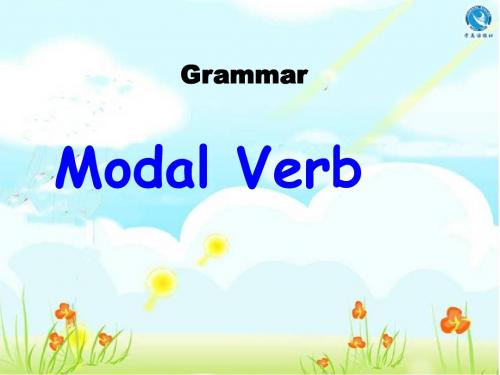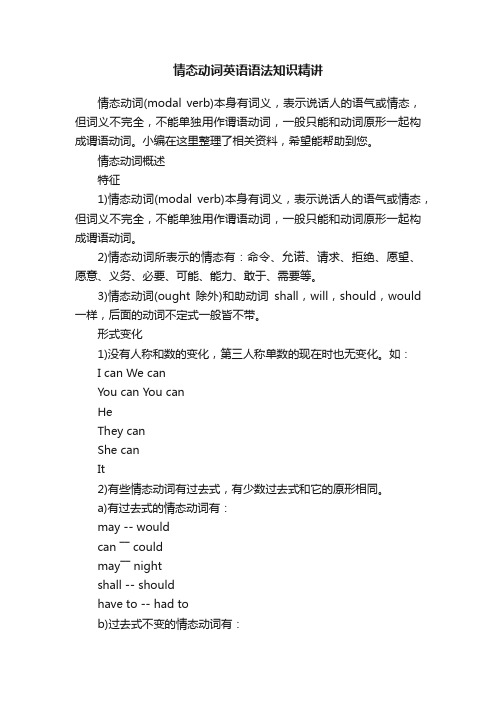modal verb
语法 Modal Verbs情态动词 课件 2021-2022学年高中英语人教新课标必修三

I commanded that you (should) go to the front immediately.
重点语 法规则!
宾语从句
从句的谓语:should+动词 原形,其中should可以省略
虚拟语气
常见的,后接宾从要用虚拟语气的动词还有:
四个“要求”:request, require, demand, desire
Your parents will try their best to help you. 你的父母会尽最大努力帮助你。
用法:
① 表示义务、必要或命令 : You must come early tomorrow.
② 表示推测“肯定,一定”: They must be at home. The light is on.
Tom can swim. =Tom is able to swim.
汤姆会游泳。
can
(could)
(疑问句中)表示 请求
可以 Could you give us a hand?
你可以帮我们一下吗?
(否定句、疑问 句中)表示可能 性
The boy can’t be Jim. He’s can可能 much taller.
2. 实义V.
肯:dare to do 否:don't dare to do
e.g.: I dare to swim . He doesn’t dare to swim.
1. You ____to the meeting this afternoon .
A needn’t to come
B don’t need come
need 需要,有必要
1. 情态V, 肯:need do 否:needn't do
modal verb(情态动词)

Modal Verb
什么是情态动词? (Modal Verbs) 情态动词表示说话人的某种 感情或语气,对某一动作 或状态的某种态度。 表示“需要、可以、 必须、应当”等。
情态动词的语法特征
1. 情态动词不能单独做谓语,除ought 和have外,后面只能接不带to的不定式。 2. 情态动词没有人称,数的变化,但有 些情态动词,如can, will也有一般式 和过去式的变化。
may 常用来表示: A. 表示请求、允许: B. 表示说话人的猜测: “也许” “可 能”: 通常只用于肯定句和否定句中。
C. 表示祝愿; 但语气较正式: might 的用法有: 多在间接引语中表示过去的可能和允 许。如: She said that he might take her bike. 她说他可以拿她的自行车去用。
表示现在的许可,语气比may 较委婉,
一般用于疑问句(包括间接疑问句),
不可用于肯定句或者否定句。
如: Might I have a word with you?
我可以和你说句话吗?
will和would
1. will是助动词还是情态动词?
will用于构成将来时是助动词。
用于表示“意志”“决心”“请求”是
2. 表示否定的情态动词的用法:
部分情态动词的否定式是情态动词中的 考点之一。 mustn’t 不准; 禁止 needn’t 没必要 ( = don’t have to ) can’t 不能; 不可能 may not 不可以; 可能不 shouldn’t 不应该 ( = ought not to )
表示主语的义务或责任: You should take care of your sister. 你应当去照顾你妹妹。 或指出一个正确、明智的动作: They shouldn't allow parking here; the street is too narrow. 这儿不该允许停车;马路太窄了。
modal verbs 情态动词

You must not cycle.
You must not enter.
You must be careful.
You must turn left.
You must pay ten yuan.
You must keep silent.
You must not smoke. You must not turn right.
★
情态动词
情态动词不能单独作谓语动词,后接其它 动词原形做谓语,没有人称和数的变化。
1. 表示能够或不能做某事用can 或 can’t;
A bird can fly . Fish can’t live without water.
2. 告诉人们必须或禁止做某事用must
或mustn’t;
You must hand in your homework at once. You mustn’t talk loudly in public.
肯定句 1. 现在时 2. 过去时 1. I can speak Chinese. 否定句 1. 现在时 2. 过去时 1. I can’t speak Chinese.
2. I could speak Chinese when I was a kid.
2. I couldn’t speak Chinese when I was a kid.
subtract ____ Can Kitty _________? Yes, she can. _____________
may (perhaps) 也许,可能
• “may” 常被用来表达可能性,也可以表示 请求。
表示请求: May I use your bathroom? 表示可能性 :I may go shopping in the afternoon. may的过去时 might He might be our new teacher. PS:might也可以表示推测,可能性比may小,语 气更婉转。
情态动词(Modal Verbs)

另一类意思涉及必须做某事或允许做某 事之类的意思:情态动词可以用来表示 某人必须做某事、某人能做某事,如果 某事发生(或不发生)就会好一些,或 者某事是许可或禁止的。
一、表示有把握的程度 情态动词可以表达对于某一事实 或事件有把握的各种不同程度。
a完全有把握(肯定的或否定的)
1. shall用于第一人称: I/We shall be away tomorrow. I shan’t be late on Wednesday. 2. will 用于各种人称: That’s the phone. That’ll be Tony. Things will be right. It won’t rain this evening. You’ll be right.
情态动词 modal verbs
情态动词 情态动词 的 特点
1)有特定的词义 ) 2)没有人称和数的变化 ) 3)其后加动词原形(do), have done ,be doing. )其后加动词原形
易混易错用的情态动词
1。区别must / have to 。区别 Must表示人在主观上认为的必要、必须、一定要 表示人在主观上认为的必要、 表示人在主观上认为的必要 必须、 Have to表示受环境或习惯支配的客观必要 表示受环境或习惯支配的客观必要 不得不” 能用于更多时态。 “不得不”,能用于更多时态。 1)Soldiers ________obey officers. must have to 2)It’s raining outside.We_________stay at home. 3As he had broken his leg, he had to , ______lie in bed.
can’t, couldn’t
情态动词讲解课件

1.Can this be an excuse for not giving them help? 表示惊异、怀疑、不相信 2.This can’t be true. 等态度,主要用在否定句、 3.How can you be so crazy. 疑问句和感叹句中。
特别说明:
1.could用来表示请求时,语气委婉,主要用于疑问句,不能用于肯定句,答语应用can(即:could不能 用于现在时态的简略答语中)。如: ——Could I use your dictionary? ——Yes, you can.(否定回答可用:No, I’m afraid not.或者是you can’t)
1.May you succeed. 2.May you live happily! 3.May she rest in peace.愿她安息。
1.There is nothing to do, so I may as well go to bed. 2.You may as well tell us now, we’ll find out sooner or later. 3.I suppose we might as well go home.
在表示请求、允许时,might比may语气 更委婉些。用May I征询对方许可在文体 上比较正式,在日常用语中,用Can I征 询对方意见更为常见。
1.Might I borrow your pen 2.I wonder if I might speak to your son.
表示可能性的推测,通常用在肯定句和否 定句中,含有“或许”“大概”“可能” 之意;用might代替may时,则语气显得更 加不肯定。 may用于祈使句表示祝愿
1) 情态动词不能表示正在发生或已经发生的事情,只表示期待或估计某事的 发生。
情态modal verb

情态动词: Modal Verb(一)can & could1.表示能力。
Can you finish this work tonight?Man cannot live without water.2.表示请求和允许。
Can I go now?You can have the book when I have finished it.3.表示可能性(可以,可能)。
We can call for you at nine.You can’t sell the cow and drink the milk, as the saying goes.4. 表示推测某人或某物1时的情况(有时候会……)SARS can be very dangerous.He can be very friendly at times.5.表示惊异、怀疑、不相信的态度(用在否定句、疑问句或感叹句中)Can this be true?How can you be so careless!This cannot be done by him*注意:1.can 的将来时,可用be able to 代替。
I ‘ll be able to come this afternoon.2.表示“某事已做成功”时,应用was (were) able to 不用could.He was able to go to the party yesterday evening and he enjoyed himselfvery much.(二)may (might)1.表示请求、可以、允许,might 笔may的语气更委婉。
---May I use your pen?---No, you musn’t.Might I ask you a few questions? (语气较委婉)He may not go to the cinema this evening.(可能不,含有猜测语气)2.用于祈使句,表示祝愿。
情态动词--modalverbs

情态动词--modalverbs情态动词(Modal verbs)情态动词有can (could), may (might), must, have to, shall (should, will (would), dare (dared), need (needed), ought to等。
情态动词无人称和数的变化;不能单独使用,必须与其后的动词原形构成谓语一、can, could1)表示能力(体力、知识、技能)。
Can you lift this heavy box?(体力)Mary can speak three languages.(知识)Can you skate?(技能)此时可用be able to代替。
Can只有一般现在时和一般过去式;而be able to则有更多的时态。
I’ll not be able to come this afternoon. 当表示“经过努力才得以做成功某事”时应用be able to,不能用Can。
如:He was able to go to the party yesterday evening in spite of the heavy rain.2)表示请求和允许。
----Can I go now? ----- Yes, you can. / No, you can’t. 此时可与may互换。
在疑问句中还可用could, might代替,不是过去式,只是语气更委婉,不能用于肯定句和答语中。
---- Could I come to see you tomorrow? ---- Yes, you can. ( No, I’m afraid not. )3)表示客观可能性(客观原因形成的能力)。
They’ve changed the timetable, so we can go by bus instead. This hall can hold 500 people at least.4)表示推测(惊讶、怀疑、不相信的态度),用于疑问句、否定句和感叹句中。
情态动词英语语法知识精讲

情态动词英语语法知识精讲情态动词(modal verb)本身有词义,表示说话人的语气或情态,但词义不完全,不能单独用作谓语动词,一般只能和动词原形一起构成谓语动词。
小编在这里整理了相关资料,希望能帮助到您。
情态动词概述特征1)情态动词(modal verb)本身有词义,表示说话人的语气或情态,但词义不完全,不能单独用作谓语动词,一般只能和动词原形一起构成谓语动词。
2)情态动词所表示的情态有:命令、允诺、请求、拒绝、愿望、愿意、义务、必要、可能、能力、敢于、需要等。
3)情态动词(ought除外)和助动词shall,will,should,would 一样,后面的动词不定式一般皆不带。
形式变化1)没有人称和数的变化,第三人称单数的现在时也无变化。
如:I can We canYou can You canHeThey canShe canIt2)有些情态动词有过去式,有少数过去式和它的原形相同。
a)有过去式的情态动词有:may -- wouldcan ―― couldmay―― nightshall -- shouldhave to -- had tob)过去式不变的情态动词有:must - must (或had to)ought to - ought toneed---needdare - dare(亦可用dared)3)大多数情态动词后面可用动词的进行式、完成式和被动形式,如:can(may,must)be doing,can(may,must) have done,can(may,must)be done等。
否定式情态动词和助动词一样,后面可直接跟否定词not。
现将情态动词的否定式及其否定式的简略式(简略式用于口语中)列举如下:shall not--shan't [FB:nt]will not---won't [wEunt]can not-can't [kB:nt]must not-mustn't [5mQsnt]should not-- shouldn'twould not-- wouldn'tcould not-- couldn'tdare not- daren't [dZEnt]need not-- needn't在疑问句中的用法情态动词在疑问句中的用法和助动词相同。
- 1、下载文档前请自行甄别文档内容的完整性,平台不提供额外的编辑、内容补充、找答案等附加服务。
- 2、"仅部分预览"的文档,不可在线预览部分如存在完整性等问题,可反馈申请退款(可完整预览的文档不适用该条件!)。
- 3、如文档侵犯您的权益,请联系客服反馈,我们会尽快为您处理(人工客服工作时间:9:00-18:30)。
10.Tom’s father promised, ―You ___have a new computer if you pass the coming examination,‖ ( C ) A.can B. should
C. shall
D. may
11.---- Did you walk home by yourself last night ? ---- Yes, I did. But I think I _____. ( D ) A. needn’t B. shouldn’t
பைடு நூலகம்
4、 be able to can
must have to
would need used to do dare mustn’t don’t have to=needn’t
5、Shall 1)用于第一人称表将来。I shall go to work after I have finished school.
(1) 对现在或将来情况推测:must +动词原形。
(2) 对过去情况推测:must (may, might)+ 完成时。
You must have met him before.
must—may—might可能性依次减弱
must只能用于肯定句,译成“一定”。否 定和疑问分别用can’t / couldn’t和can / could。
13.--- I thought I ____something burning. (C ) ---Really ? A.smelled B. was smelling C. could smell D. might smell
14. She _____out alone at night. ( C ) A. dare not to go B. dares not go C. doesn’t dare to go D. doesn’t dare go
2)译成“本可以/本应该…‖ could/should have done. You should have come here five minutes earlier. 3)虚拟语气(与过去事实相反的主句) If you had followed my advice(Had you followed), you wouldn’t have been defeated.
情态动词 的用法
一、情态动词注意事项
1、Could I borrow your book?
Yes. Of course you can\may.
2.
Would you like to do it for me ?
Yes. I would like to.
2、推测语气
must只能用于肯定。否定和疑问分别用can’t 和can。 He must be telling a lie. He can’t tell a lie. *Must-should/ought to –may-might/could+do 可能性依次减弱 Can he tell a lie ?
A. May B. Must C. Can D. will
9.Jenny ____with him at that time, for I was having dinner with her in my home. ( A)
A. can’t have been B. mustn’t have been C. must be D. may be
6、should 1)预测、可能。They should be here by now.
2)说话人的感情。如惊奇、愤怒、 失望等、“竟然” You can’t imagine that well-behaved gentleman should be so rude to a lady.
7、情态动词+have done 1)对过去情况推测。 must/may/might have done can’t/couldn’t/may not/might not have done can/could… have done…?
2. Johnny, you ______play with the knife, you ____hurt yourself. ( B ) A. won't ; can't B. mustn't ; may C. shouldn't ; must D. can't ; wouldn't
3. The fire spread through the hotel very quickly but everyone _____get out. (D ) A.had to B. would C. could
2)用于一、三人称疑问句、表征求对 方意见或向对方请求。 Shall he/I come in? — Come in, please. 3)用于二、三人称,表示保证、承诺、 威胁、警告。 You shall be punished if you insist on doing it this way.
C. may not have
D. needn’t have
12. You ought to have helped him with his English, ____you ? C A. won’t you B. ought not you C. shouldn’t you D. wouldn’t you
D. was able to
4. ------When can I come for the photos? I need them tomorrow afternoon. -----They _____be ready by 12 : 00 . ( B ) A. can C. might B. should D. need
5. With so much work on hand, you ____to see the game last night. (D )
A.mustn’t go B shouldn’t go C. could have gone D. shouldn’t have gone
6.They are disappointed at the English party. They say that it ___better organized. ( D ) A. had been B. had to be C. must have been D. could have been
7.She must have forgotten about the class _______? ( C ) A. doesn’t she B. mustn’t she C. hasn’t she D. won’ t she
8. See who’s there ! _______ it C be Mary ?
Could /Can it have happened last night ? It couldn’t/can’t have happened last night.
3、表猜测语气的反意疑问句的构成 He must be reading, isn’t he? He must be in the classroom, isn’t he? He must have gone over the article, hasn’t he? It must have rained last night, didn’t it?
情态动词典型例题专练
1.-----There were already five people in the car but they managed to take me as well. -----It ____a comfortable journey. ( D ) A.can't be B. shouldn't be C. mustn't have been D. couldn't have been
